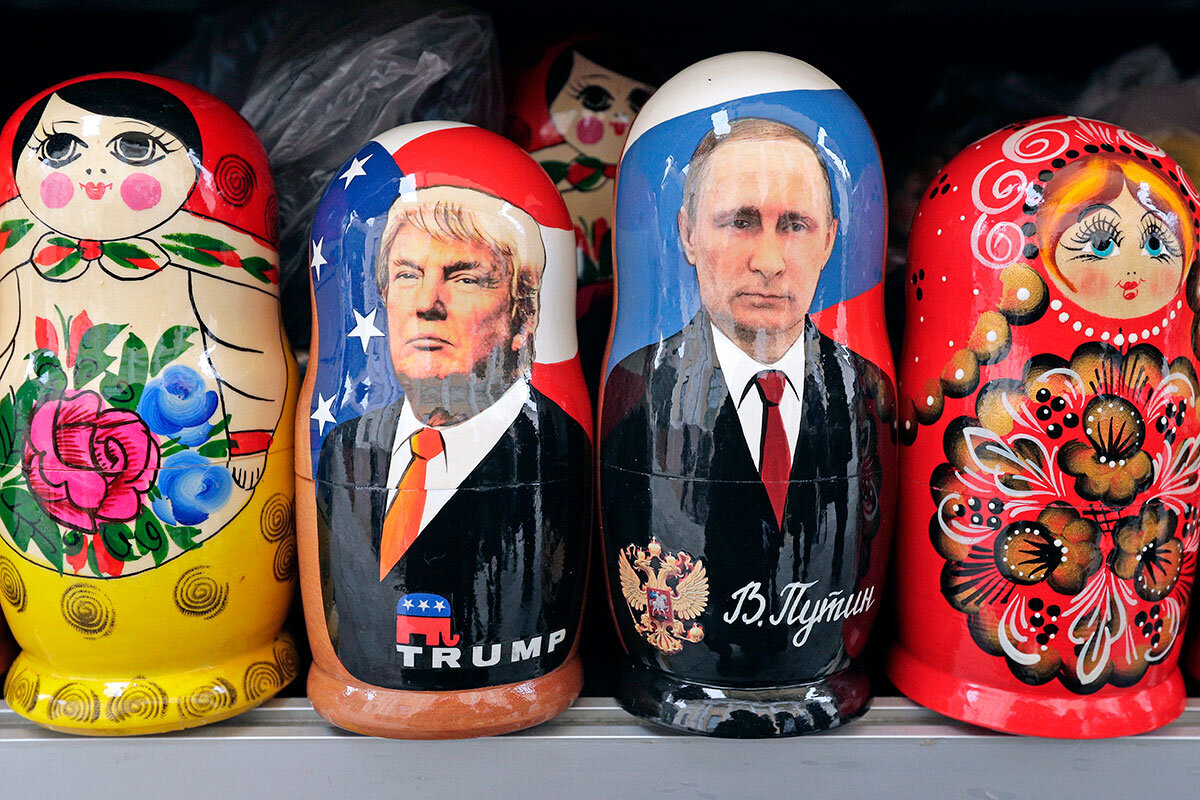When President Trump meets Vladimir Putin for the very first time, on the sidelines of the Group of 20 summit in Germany on Friday, it is going to be one of the most eagerly awaited and anxiously watched handshakes in history.
Yet both sides have been carefully tamping down expectations for any kind of breakthrough at the meeting, each with their own very good reasons.
For Mr. Trump, whose campaign team is being investigated for alleged collusion with Russia, staying quiet on specifics is likely an effort to manage media speculation about the burgeoning scandal. But for the Kremlin, whose initial high hopes for more sympathy from Trump than his predecessor have been battered by a series of abrupt and unpredictable shifts out of Washington, the reason is simpler: they don't know if the beleaguered, mercurial Trump can realize results at all.
“I think the main Russian plan here is to evaluate whether Trump is able to deliver on anything he talks about,” says Fyodor Lukyanov, editor of Russia in Global Affairs, a leading Moscow foreign policy journal. “We know he is embroiled in battles at home, with the media, and the foreign policy establishment, and probably can't do much right now.”
“But if the political situation in the US stabilized, we wonder, could he, would he? I think Putin hopes he might come away with a better sense of whether there is any hope of pursuing our agendas with this president, or not.”
'In great suspense'
Kremlin spokesman Dmitry Peskov said Wednesday that the Trump-Putin meeting would probably be the most important spectacle at the G20 summit, and that US-Russia relationship is “vital for the whole world.”
But asked about specific Russian hopes, he offered a laundry list of issues that didn’t differ much from Russian concerns before any of the Russian president’s many meetings with Barack Obama, including the centrality of the Minsk accords to settling the Ukraine conflict, the lack of mutual US-Russian understanding on Syria, and the fight against global terrorism.
In the US, every second of the meeting from the handshake on is apt to be scrutinized for clues to the underlying relationship between the two men, a concern that has been magnified by the investigations into the relationship between the Kremlin and Trump’s team, and months of media speculation.
“The Trump administration isn’t saying much at all about its expectations for this meeting. That’s probably wise considering that anything they say will get held up and examined from a thousand different angles,” says Sergei Strokan, a foreign affairs columnist for the Moscow daily Kommersant.
“Even here in Russia there's a lot of discussion about how Trump will play this. He knows people are saying that Putin will outmaneuver him, eat him for breakfast, etc. Trump will obviously want to make sure he contradicts that impression. On the other hand, he's a stubborn guy who got elected saying he would get along with Putin and improve relations with Russia. He may want to do something to stick it to his critics, show that he intends to deliver on that,” Mr. Strokan says.
“Frankly, we're all in great suspense here.”
Growing doubts about Trump
Many Russian foreign policy experts have been leery of Trump since before he was elected, but recent polls suggest that the Russian public may be souring on him as well. A poll conducted by the state-funded VTsIOM agency in April found that the number of Russians with a negative attitude toward Trump increased by 7 percent to 39 percent since his inauguration.
On the other hand, a global Pew survey last month contrasting attitudes toward the US under Obama and Trump found that confidence in US leadership had plummeted in most countries – with Russia being a notable exception. Only 11 percent of Russians trusted the US under Obama’s leadership, a number that leapt to 53 percent in the spring of this year.
But analysts say they’re losing faith in the Trump approach for specific reasons.
“Under Obama, our foreign minister, Sergey Lavrov, worked closely with John Kerry, meeting constantly and hammering out details about the situation in Syria,” says Middle East expert Leonid Isayev, an associate professor at Moscow’s Higher School of Economics. “There was a lot of work going on. Not enough, of course, but Kerry was a hard-working and responsive counterpart. We do not see that kind of attentiveness to practical problems from the Trump administration. Honestly, some of us feel quite nostalgic for the days of working with Kerry.”
There may be a more fundamental reason that Russian hopes for a new deal with the US appear so elusive.
“If you follow the US media you would think that they must be obsessed with Russia, that Russian influence looms over everything,” says Mr. Lukyanov. “However, that is all illusory. Maybe it means we're winning the propaganda war or something like that. But in terms of actual economic output and global trade, the factors that Trump the businessman supposedly values most, Russia hardly counts at all. China matters a lot, but Russia is a marginal player.”
“This is a really hard pill for Russians to swallow, but it may shape the future of our relationship with the US more than we like to think.”
Still, all eyes will be on Trump and Putin when they take the stage together on Friday.
“There is a Russian saying that ‘hope dies last,’ ” says Strokan. “Nobody thinks that this will be a problem-solving meeting. It’s all about image and atmospherics, creating the impression that Putin and Trump can work together, that the relationship has been steadied. Some such positive signal is probably the most we can hope for.”





